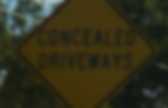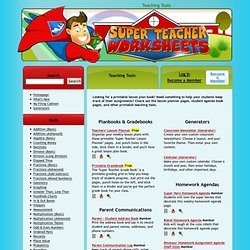

Tricia
School Library. Maker Faires. K-12 Rubrics and Assessment. Teacher Tools. Printable Lesson Plan Book Pages & Homework Assignment Sheets. STW Filing Cabinet Logged in members can use the Super Teacher Worksheets filing cabinet to save their favorite worksheets.

Quickly access your most commonly used files AND your custom generated worksheets! Please login to your account or become a member today to utilize this helpful new feature. :) [x] close This document has been saved in your Super Teacher Worksheets filing cabinet. Here you can quickly access all of your favorite worksheets and custom generated files in one place! Click on My Filing Cabinet in the menu at the upper left to access it anytime! Grade Level Estimation Title: Grade Level Estimation: 1st2nd3rd4th5th Grade level may vary depending on location and school curriculum. Common Core Standards Common core standards listing. All common core standards details.
If you think there should be a change in the common core standards listed for this worksheet - please let us know. [x] close Looking for a printable lesson plan book? Planbooks & Gradebooks Teachers' Lesson Planner Free. TeachersFirst: The web resource by teachers, for teachers. Learning, Innovation and Society. Education.
Interesting Search Engines. Coupons. Bloom's Taxonomy. BloomsTaxonomyQuestionStems.indd. SchoolTube. HiTech Gadgets. 25 TED Talks Perfect For Classrooms. The 50 Best Sources of Free STEM Education Online 12.05K Views 0 Likes Colleges, universities, and other educational forums in your community can be excellent places to learn more about a variety of STEM topics, but there is also a wealth of educational material available on the web for those who prefer to learn at their own pace or take a more individual approach.
What Do Emotions Have to Do with Learning? Thinkstock When parents and teachers consider how children learn, it’s usually the intellectual aspects of the activity they have in mind.

Sidney D’Mello would like to change that. The University of Notre Dame psychologist has been studying the role of feelings in learning for close to a decade, and he has concluded that complex learning is almost inevitably “an emotionally charged experience,” as he wrote in a paper published in the journal Learning and Instruction earlier this year. During the learning experiments described in his paper, he notes, the participating students reported being in a neutral state only about a quarter of the time. The rest of the time, they were were experiencing lots of feelings: surprise, delight, engagement, confusion, boredom, frustration. Another counter-intuitive contention made by D’Mello is that even negative emotions can play a productive role in learning. Animated agents discussing scientific case studies. Critical & Creative Education. Free Educational Videos for K-12 Students.
Time For Kids. Create a PicLit. Animation. ICT. Access your bookmarks anywhere. Smartboard. Sample Curriculum Map Page-6th Grade English/Language Arts - Curriculum Mapping. Pedagogy. Web 2.0. Childrens online games. Pearltrees videos. ABC. Nikola Tesla. Google Trivia. Help. Maths sites. SAMR. Google Drive. Videos - Cox Elementary Library - Elementary School Libraries at Leander ISD Elementary Schools.
UDL Resources. Repositories. Geotribu.
Inquiry continua Aus.docx. Curriki. How to Use Google Search More Effectively [INFOGRAPHIC] Among certain circles (my family, some of my coworkers, etc.)
![How to Use Google Search More Effectively [INFOGRAPHIC]](http://cdn.pearltrees.com/s/pic/th/google-effectively-infographic-127984952)
I'm known for my Googling skills. I can find anything, anywhere, in no time flat. My Google-fu is a helpful skill, but not one that's shrouded in too much mystery — I've just mastered some very helpful search tricks and shortcuts and learned to quickly identify the best info in a list of results. Sadly, though web searches have become and integral part of the academic research landscape, the art of the Google search is an increasingly lost one.
A recent study at Illinois Wesleyan University found that fewer than 25% of students could perform a "reasonably well-executed search. " That search process also included determining when to rely on Google and when to utilize scholarly databases, but on a fundamental level, it appears that many people just don't understand how to best find the information they seek using Google. Thanks to the folks at HackCollege, a number of my "secrets" are out. Infographic via HackCollege. The Book to Art Club. My Links.